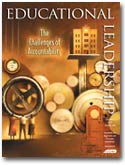Accountability at its best reflects a prudent concern for good stewardship and responsible management of necessarily scarce resources; at its worst, it becomes a form of mindless hectoring in which careful oversight gives way to invective and finger-pointing. Indeed, for educators on the receiving end, accountability has often appeared to be all stick and no carrot, a process in which much is expected, little specified, and less acknowledged.
Familiar to anyone who follows education is the intrinsic difficulty of measuring performance in ways that make sense. When hard measures meet soft outcomes, suspicion, discord, and cynicism are not far behind.
What has changed in this equation? IT. Information technology. The capacity—in real time, online—to collect, assemble, manage, and make sense of large aggregations of data; to turn data into information; to turn information into knowledge; to turn knowledge into wisdom; and to turn wisdom into wise and considered action.
By contrast, old data is the stuff of history, the bête noire of accountability. An example familiar to educators is the spring test whose results are not available until the following fall. Such data serves no diagnostic purpose. At its worst, such data becomes part of a game called gotcha immortalized in Eric Berne's book Games People Play. But fresh data in the hands of thoughtful analysts and wise professionals is a pearl beyond price. It permits fine-tuning policy and improving practice; it holds out the promise of transforming problems into opportunities and, most important, the celebration of success.
In this context, accountability builds confidence as it improves performance. Although accountability is a tool for fostering discipline, it achieves its objectives by clarity, intrinsic utility, and fairness; it identifies objectives and uses understandable—and accepted—measures. Meaningful accountability is not something imposed on an unwilling subject; instead, it is a part of a social contract in which responsible parties agree to goals, objectives, and measures.
Teachers do not have tool kits hidden, waiting to be used when the hammer of accountability falls. Accountability will not work as a brute-force enterprise. Neither teachers nor students can be scared into compliance. Quite the contrary. To be effective, accountability systems must embed diagnostics and the opportunity to reallocate resources.
In this connection, I am reminded of my favorite book of the year, Michael Lewis's Moneyball: The Art of Winning an Unfair Game. Ostensibly the story of the Oakland A's—one of the financially poorest teams in baseball yet one of the best—it is actually the story of data-driven decision making and how it works in the arcane, even superstitious, world of baseball. Outspent by the Mets and the Yankees by factors of three or four to one, the A's simply could not compete for high-priced talent. They could, however, compete for low-priced, unacknowledged talent.
Again and again—using the power of IT—the team's front office identified highly talented players whom other teams had missed. How did they do it? They looked at players' stats, what they had already accomplished—in college ball, the minors, and other pro teams—rather than at what scouts saw as their promise. And they also looked at indicators that other teams ignored, such as propensity to get on base—which includes walks as well as hits. Although it seems obvious in retrospect, getting a walk is as useful to the team as getting a hit—although both the batter and the fan have been schooled to prefer the drama of a hit.
So powerful is the lure and the lore of the hit that many otherwise good batters go down swinging, suckers for anything near the strike zone. The good batter who resists the temptation to swing early can get on base (including walks) more often than the good batter who swings too early. And getting on base is necessary to score runs. A simple enough observation, but one that cuts across the grain of decades of baseball culture.
The baseball example is more than a metaphor. A mix of art and science, ineffable talent and hard work, hustle and luck, hard numbers and hazy memories—baseball and education are much alike. Both enterprises are awash in data, yet only a few teams and a few schools use data to solve problems. And if one baseball team can use stats for decision making (and not just to impress the uninitiated), any social institution can—schools included.

